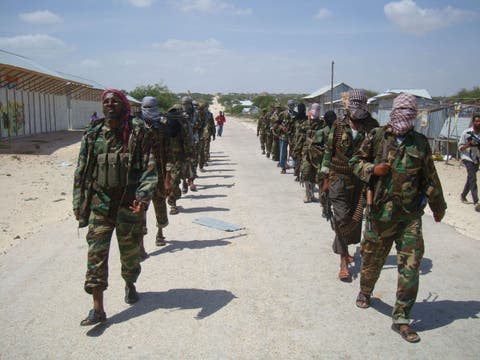Mogadishu (caalamka.net) – The Al-Qaeda-affiliated jihadist group, Al-Shabab staged another offensive against the African Union’s military base in Bulo Marer, a town approximately 120 kilometers southwest of the capital, Mogadishu, the African Union force ATMIS confirmed on social media platforms.
“The base came under Al-Shabaab attack,” ATMIS issued on its official Facebook and Twitter handles, leaving the specifics about casualties or damages undisclosed. Presently, they are assessing the security situation, as per the report.
The battle over claims
Al-Shabaab promptly claimed responsibility for the assault via its communication networks, alleging it had successfully overrun the base.
However, Somali military commander Mohamed Yerow Hassan countered this claim.
“A suicide bomber drove a vehicle with explosives targeting the ATMIS base, and then gunfire broke out,” Hassan told AFP by telephone.
“The terrorists were forced to retreat and flee. The situation is back to normal now.”
In such remote corners of Somalia, it’s challenging to corroborate these assertions about army base attacks independently.
Al-Shabaab often inflates battlefield successes in its propaganda, while the AU force member nations seldom verify their casualties.
ATMIS: An offensive force
Distinguished from its predecessor, AMISOM, by a more aggressive mandate, the 20,000-strong ATMIS force draws its strength from five countries – Uganda, Burundi, Djibouti, Ethiopia, and Kenya.
Their soldiers are deployed across southern and central Somalia, with a mission to pass on security to Somalia’s army and police by 2024.
In the latest assault, the primary targets were Ugandan soldiers serving as part of the ATMIS, confirmed Uganda Peoples’ Defence Forces spokesman Felix Kulayigye, adding that they were still “cross-checking” the details.
The war on Al-Shabab
Last year, President Hassan Sheikh Mohamud of Somalia declared an “all-out war” on Al-Shabaab, rallying Somalis to aid in eradicating these jihadist “bedbugs.”
This initiative, reinforced by ATMIS and US airstrikes, has empowered the army and the local militias known as “macawisley” to reclaim significant territory in the country’s central region.
Yet, Al-Shabaab’s lethality hasn’t waned. They have carried out potent strikes against civilian and military targets, resulting in high casualties.
The deadliest incident occurred in October when two car bombings orchestrated by Al-Shabaab hit the education ministry in Mogadishu, causing 121 fatalities.
This made 2022 the deadliest year for Somali civilians since 2017, primarily due to Al-Shabaab’s actions, according to a report submitted to the UN Security Council by UN Chief Antonio Guterres.
Meanwhile, the US Africa Command announced on Monday that it had conducted an airstrike the previous weekend in Jilib, in Somalia’s south, noting that initial assessments indicated no civilians were harmed.
Despite progress by pro-government forces, the militants’ ability to cause significant harm remains a grave concern.






